Democrats in NY’s 17th district fight for open seat in Congress
June 20, 2020
The race to represent NY-17 has become one of the most competitive in the country, as it presents the opportunity to win an open seat in a secure Democratic district that hasn’t existed in nearly three decades. The candidates’ campaign aspirations have reflected that same intensity.
Tower spoke with six of the seven Democratic candidates. Democratic candidate David Carlucci did not respond to multiple interview requests, and so will not be as fully represented as the other candidates.
Meet the Candidates
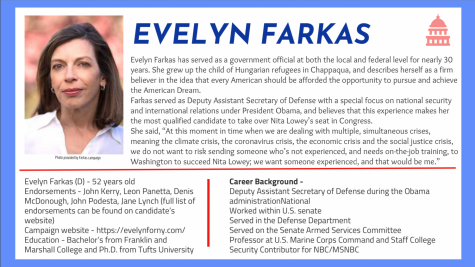
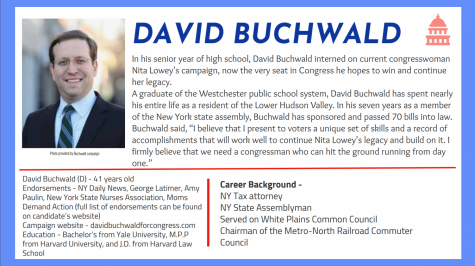
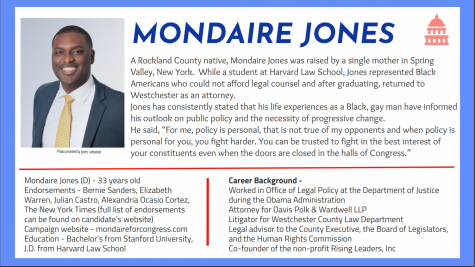
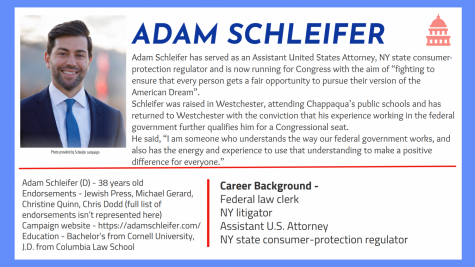
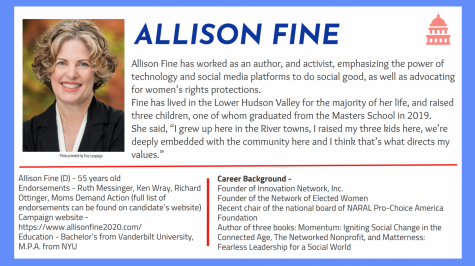
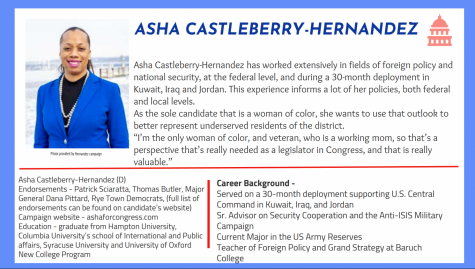
Outreach in times of COVID-19
For many of the candidates campaigning to represent New York’s 17th district in Congress (NY-17), the race was just beginning to pick up momentum when the COVID-19 crisis hit the Lower Hudson Valley. Meet and greets, live debates and traditional canvassing methods were no longer feasible with social distancing guidelines in place.
After joining the race in November, candidate Evelyn Farkas felt pressure to catch up with her opponents who had been in the race and actively campaigning months ahead of her entry. Following a busy holiday season, she was just preparing to increase her public visibility and presence when the pandemic swelled in New York.
Her team was forced to pivot to an exclusively online campaign platform, and began adapting to new outreach strategies.
She said, “We realized in order to keep our finger on the pulse of what is happening in individual communities we needed something else, and so we put together something we call the virtual “Whistle-Stop Tour”. We’ve gone through the communities in Rockland and Westchester, scheduling meetings by zip code and the idea is we are trying to have conversations focused on the issues of interest to the people in that community.”
Candidate Adam Schleifer has also moved his campaign to a virtual medium, conducting open forums to connect with voters in the district through Zoom.
“I think one of the best things about the Zoom campaign is that it’s totally free for candidates to participate in debates and forum, so I think there’s part of this that we can take and use for the future to expand the opportunities for people to engage without letting the barriers of cost or distance or time get in the way,” Schleifer said.
Candidate Asha Castleberry-Hernandez has been using methods such as phone banking, text messaging, social media promotions and traditional mailing to communicate her perspective and policies. She said she wants to use these means of connection to present her personal story and message.
Castleberry-Hernandez said, “I’m the only woman of color, and veteran, who is a working mom, so that’s a perspective that’s really needed as a legislator in Congress, and that is really valuable.”
Several of the candidates, including Farkas and Assemblyman David Buchwald have invited guest speakers to their virtual town hall meetings to present on issues of interest to the community.
Buchwald’s town halls have featured speakers including an epidemiologist, an expert on gun violence who spoke to the interactions between the coronavirus and the presence of guns in American society, a mental health expert and the White Plains mayor Thomas Roach.
Another candidate, Allison Fine, believes that the shift to majority digital platforms has only strengthened her campaign’s impact on voters.
“I made a strategic and personal decision that I was going to pivot not only to a digital campaign, but what I call a social campaign, and this is based on 15 years as a pioneer in the use of tech for social good,” Fine said.
She furthered that her opponents rely upon what she refers to as “spray and pray broadcasting”, that is evidenced by mail being thrown in the garbage as junk, while her campaign, “is based on building a deep and broad social network.”
Still, the personal connections forged by in-person campaign interactions have been missed. In times of the pandemic, all the candidates have been forced to demonstrate their abilities to adapt to unconventional circumstances.
Schleifer remarked, “I really miss the energy of the voters and I think our campaign would be doing even better than it is if we could get out there, but I’m trying to focus on the bright side and make lemonade from the lemons.”
Campaigning in light of BLM
In the wake of the murder of George Floyd at the hands of a Minneapolis police officer, political organization has emerged as an important tool in the fight for dramatic societal changes. The democratic candidates in NY-17 have had to bolster their criminal justice reform policies in response to a pool of constituents eager for progressive policies.
Some candidates have stated that their past political actions demonstrate dedication to criminal justice reform and social justice.
Farkas commented, “It’s something that I was focusing on before I jumped into the race; the reason I spoke out about it when I did years ago, was because I felt I could convince a new subset of people who might not be interested in social justice issues to pay attention because my angle on it was a little bit different and angled more towards national security.”
Jones, however, feels that as one of the only two black candidates running, he has lived through experiences as a black man that should be weighed more heavily when it comes time to vote for the best representative to support criminal justice and policing reforms.
“The way that we’re going to be distinguished in this race is no one else has my personal story.” He continued, “Especially in the midst of what’s going on right now in this country, we have more urgently needed than ever before people in congress who are able to speak with moral clarity and with lived experience about issues of racial justice.”
Castleberry-Hernandez, the only other black candidate, has also let lived experiences brought up in the wake of Floyd’s killing further motivate her to push extreme criminal justice and policing reforms.
She said, “Right now, with the George Floyd situation, it definitely hits at home for me, as far as watching someone that looks like me killed that way. It’s just a reminder that this country is still struggling with systemic racism, and as a legislator, it’s important that we address in Congress how to deal with police use of excessive force.”
New York’s legislators have taken some action in light of recent Black Lives Matter protests and rallies, though.
Recently, New York Governor Andrew Cuomo signed the repeal of 50-a into law, which was previously used to shield police misconduct from the public.
Section 50-a of New York law dates back to 1976 and states that, “personnel records [of police officers] used to evaluate performance toward continued employment or promotion” were to be confidential, away from the public. The implications of 50-a have increased in years as some police departments have stopped publicly posting the outcomes of officer disciplinary hearings.
As a state assemblyman, Buchwald had previously voted to repeal 50-a before it was signed into law by Cuomo.
He said, “I firmly believe that we need a Congressman who can hit the ground running from day one. I am someone yielding real results on these issues, and today, as a member of the state assembly, I am voting to repeal section 50-a of New York civil rights law and that section shields police misconduct from public scrutiny.”
While Schleifer’s campaign website only recently added a section under issues addressing policing reforms, he believes that his background working in the Department of Justice (DOJ) is what will make him prepared to put forth comprehensive policies.
Schleifer said, “We have to radically rethink how we are going to address our country’s original sin of slavery. We can use our DOJ and I’m the only one who understands how to do that; nobody else in this race has that background.”
Fine agrees that base-level changes need to be made to address issues of policing in America, but furthered that her focus, as an author and activist, in the field of systemic change will make lasting impacts.
Fine stated, “Chokeholds should be illegal, no question, and we should stop sending military equipment to police departments but that’s not systemic change, that’s pulling the head off of a dandelion and leaving the roots in place. Budgets and policies, though, reflect our values and in order to shift them, you have to shift the money. ”
Schleifer’s pharmaceutical scandal
The current presidential race has highlighted the distrust many far-left democrats hold for large corporations, particularly pharmaceutical companies, as support for universal healthcare has also ramped up. Schleifer’s father is the co-founder and chief executive at Tarrytown-based Regeneron Pharmaceuticals, and his shareholdings in the company have brought up a number of issues between him and several of his opponents.
Jones said of the situation, “One of the great scandals in this race is the fact that there is someone trying to purchase a congressional seat who will not feel accountable to voters. If you win an election through spending millions of dollars of your money, what incentive is there for you, once elected, to feel accountable to your constituents? – and that is scary for our democratic process and we are working mightily to prevent that from happening.”
On June 4, six of the seven Democratic candidates pledged to liquidate any direct stock holdings in pharmaceutical companies if elected, citing price-gouging and high profits. Schleifer did not sign the divestment agreement.
Days later, he addressed his choice not to sign the pledge in a Facebook video, stating that he was given only an hour to look it over and sign it, and that he had already agreed to place his shares into a blind trust if elected, so he wouldn’t sign a pledge that was so clearly targeted at him.
Schleifer told Tower, “It means that they’re [the other candidates] happy to play petty partisan politics and demonize 6,000 scientists when we’re working hard on a cure for coronavirus, and they’d rather further their own petty political agendas instead of working on solving real problems for all of us.”
Buchwald believes that to complain about the time allotted to sign the pledge fails to recognize its true purpose.
He said, “For anyone to complain about not having time to respond to a call such as that strikes me as not recognizing the corrosive influence of personal financial interests on government policy is an issue that fundamentally needs to be addressed. I don’t think one can say a blind trust works when in fact your own financial holdings are reported by the company in SEC forms on a regular basis because you’re such a large shareholder.”
After originally signing the pledge, Fine decided to rescind her signature after further evaluating its merits.
She said, “It was just a political game to paint, it was just a trick. It was a game of ‘gotcha’ and I fell in with the other candidates, and this was just nonsense and I regretted signing it. I did not get into this race to just do politics as usual. The problems are too important and too big to keep getting distracted by games of ‘gotcha’.”
Schleifer pointed out Fine’s support for him as evidence of the pledge’s lack of moral credibility.
He said, “I would point out that Allison Fine, one of the candidates, has already acknowledged how unfair this was by posting a public apology and retraction of what they did. They’re only focused on something they knew they could try to force me to talk about it in a way that seems stilted and dishonest.”
Castleberry Hernandez said she found the entire situation frustrating, but also indicative of a larger problem that exists regarding political donations and their impact on just campaigning.
She said, “Schleifer is supposedly buying the seat. I disagree with that, but we have other candidates who are getting too much money from outside of the district, to the point where it’s overwhelming, and it’s not the people in the district legitimizing the candidates.”
Big plans for Congress
The race to represent NY-17 has become one of the most competitive in the country as it presents the opportunity to win an open seat in a secure Democratic district that hasn’t existed in nearly three decades. The candidates’ campaign aspirations have reflected that same intensity.
Jones has consistently emphasized the value of his personal message in connecting with voters now, and making large-scale changes in Congress later.
“For me, policy is personal, that is not true of my opponents, and when policy is personal for you, you fight harder, you can be trusted to fight in the best interest of your constituents even when the doors are closed in the halls of Congress.”
Farkas feels that her policies reflect a political agenda that is just as socially and economically progressive as those of her peers, but that her experience, particularly in the realm of national security, is what will set her apart if elected.
She said, “I have probably almost the exact same policy proposals as the left candidates in any race in America; the difference between them and me is that I am 52 years old and I have a lot of experience. I don’t fit the mold perhaps, but I am in my policy, in my outlook and what’s in my heart.”
Castleberry Hernandez also has a strong focus on national security and foreign policy that echoes throughout her policy-driven campaign. She said she wants to bring this perspective to the seat in Congress, while also upholding Lowey’s lasting legacy.
“We have a legend who is leaving, and we need someone who is realistic about policy, who doesn’t just sell exaggerated rhetoric.”
As a current New York state assemblyman, Buchwald echoed Farkas’ commentary on the value of lived experience in government. He firmly establishes the notion that change will only come from someone who has already yielded “real results” on important issues.
Buchwald said, “On numerous things that our next generation of democratic voters is focused on, they have a clear choice between an approach that focuses on being the loudest on top of the soapbox and an option of someone who rolls up their sleeves and actually gets the job done.”
Schleifer, who has also worked closely with the federal government throughout his career, wants to continue what he views as a narrative of him protecting the vulnerable members of the nation, and working towards the greater good.
Schleifer said, “I’ve done real work for real people which is what matters: protecting people in New York from predatory lending, financial abuse and the federal government, protecting people from crime and abuse and bullying, and standing up for victims.”
Fine, who hasn’t worked directly in any governmental capacity, maintains that her record as an author, and activist demonstrates her ability to wholly represent the district.
She emphasized, “We need someone in Congress that is innovative and an entrepreneur– that’s me–who understands where tech is going–that’s me–and who’s been fighting for social justice for my entire career. This district is my home and I care deeply about how we are living here.”
Jones also calls this district his home, and said that he wants to proudly represent its values and interests, although, as a child, he wouldn’t have imagined himself to be in this position.
“I can only be my authentic self, and when I was growing up, I never imagined someone like me could run for Congress, growing up poor, black and gay. In fact, there’s never been an openly gay black member of Congress in the 244 year history of the United States.”



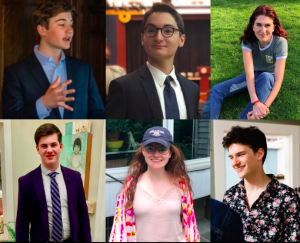

Shelley • Jun 21, 2020 at 12:16 PM
Wow! So well written and informative. The editor in chief has a bright future ahead of her.